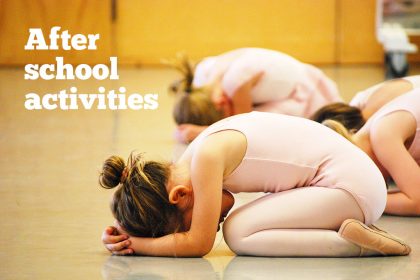How to choose the right after school activities for your child
With so many after school activities to choose from, how do know which ones are right for your child? Read our guide to find out!
At the start of every school term, the inevitable letters start coming home, inviting your child to sign up for a wide range of different activities – from science or chess club, to tennis or rounders. On top of these are the wide range of local clubs and extra curricular activities available, including Brownies, rugby, Kumon, Brazilian jiu jitsu and karate.
But how do you know which ones are best for your child? Or even how many they could or should be doing? To help you decide, Kristen Harding from My Family Care shares her quick guide.
We need to be picky about which clubs we choose
As working or business mums, we know what it’s like to be busy. We’re juggling our own schedules with those of the entire family and we know how much we want to put our feet up at the end of the day.
So, as much as it’s wonderful that our children have the opportunity to spend time with their friends and learn new skills in after school and weekend clubs and activities, it’s important that we don’t overload them. And that means being picky about which clubs and activities we sign them up for.
Which after school club should you pick?
There are so many different clubs available now that whittling down your child’s interests can be a challenge in itself. Do you give the the option of the old standbys like ballet and football, or encourage them to spread their wings and try street dancing and martial arts?
While too many activities can leave your child tired and overwhelmed leading to withdrawal and stress, boredom has its own side effects. Both over stimulation and under-stimulation have an impact on children – take note and reassess your situation if they become overtired, irritable, moody or start acting out.
The right choice will depend on your child’s wishes and needs so it’s important to listen closely and observe how they respond to different activities. Families have learned that safe kids martial arts training can help them build resilience, discipline, and a positive outlet for energy. These classes provide structure without overwhelming pressure, striking a healthy balance between challenge and enjoyment. When children feel both stimulated and supported, they’re more likely to thrive emotionally and physically.
How to choose the right after school activities for your child
Self-confidence, discipline, and social skills are often developed outside of the classroom and compliment textbook knowledge and structured play.
To help you choose the right activities for your child and harness these advantages, here are some considerations to take into account.
The cost
From new kit pieces to travel costs, extracurricular activities can be expensive. So make sure you know how much an activity costs before you commit to it. If you can’t afford it, make sure it’s not included in the list of choices, or be prepared to have a frank discussion about money!
The time
Think about how much time an activity will actually take – there’s the time for the activity, plus travel to and from as well as prep time! Consider this when you are trying to plan your schedule.
The number
Don’t take on too much. Start with one activity and see how your child reacts – are they suddenly too tired to concentrate on homework or throwing tantrums you thought they’d grown out of? If there is no change, or the change is positive, look at adding another club the following term.
Re-assess this when your child changes a year group or is taking on a big exam. Things will change every year, new friends, new teachers and personal development may all require more time and energy. Think about under-promising and over-delivering – we all know that taking something away is harder than offering it up – once you commit to the term you’ll have a hard time saying no half way through.
Homework and housework
Children need to be able to have fun and let off steam but they also have responsibilities like homework and household chores. We all know that by the end of the day our concentration is waning and while an hour at the gym can help you get your second wind, it can also leave you feeling tired and ready for bed!
The later they get home from clubs, the more likely it is that they will not have the energy to concentrate. Keep an eye on homework and make it a condition for joining clubs.
Be vigilant and keep an eye on their school work – if you notice a sharp decline with the introduction of a club, you’ll need to have a discussion with your child.
Don’t let the immediate reaction of cancelling the club win. Instead, give them a chance to prove that they can do both, but let them know what the consequences are if they do not pull up their socks!
As children get older and they are able to help plan their own schedule, this is a great way to hand the responsibility over to them as your child will start to manage their own work-life balance.
Together time
Extra-curricular activities can often turn mum and dad into chauffeurs, especially if you have more than one child.
But don’t forget the importance of family time. Whether it’s a Saturday morning hike or a meal that you all commit to once a week, ensure that family time doesn’t get overruled by other activities.
Different types of play
Some children naturally get along well and play well with others, while other children need a little more encouragement. Take this into account when deciding whether your child needs to be involved in extra activities.
It’s important for children to develop their own unstructured play, so determining how much time your child needs to do this is key. If a child who prefers structured play is never given the chance to be on their own, they will get bored very quickly – and as their parent, you will find yourself unable to leave them be.
On the other hand, if your child prefers to play on their own, some structured play with other children will help them improve social skills and confidence in group situations.
Have fun
Clubs and activities are supposed to be fun. Let your child provide input into the types of activities they would like to do and the ones they don’t. Just because you didn’t get to dance the Nutcracker when you were a child doesn’t mean that your son or daughter wants to take ballet now.
If you want them to play an instrument, let them choose which one. However, make sure you give them options you’ll be happy with. (If you live in a small flat without soundproofing you might want to eliminate the drums up front!)
If they want to play sports let them indicate which ones they would like to play and then see what fits into their schedule. Find out what activities their friends are involved in and see if your child is interested in the same ones; parents sharing pickups and drop offs becomes very useful.
Care arrangements
Think about what care arrangements you have in place, and how these will fit in around after school activities. If you have a nanny, they will be an extra set of hands and feet to ferry children to and from school, but a childminder may not be as flexible as they will have other children in their care.
If your partner works long hours remember that you will need to be able to coordinate a plan that you can execute with military precision.
If you find yourself stuck, needing to be in two places at once, backup care services like emergency childcare are useful in a crisis. So you can still make it to one child’s league final game, while your other child is studying for their French exam with an emergency nanny.
Find the right after school activities for your family
The right after school activities will give your child the opportunity to learn new skills and enjoy activities that help them develop into a well-rounded, happy adult. They’ll also fit into your family routine, without causing you too much extra work and inconvenience.
We hope this guide helps you to find the right activities for your children and family!
Kristen Harding was a nanny for eight years, taking care of five different families. Today she uses her experiences to help raise awareness of childcare choices through her role with My Family Care and their sister companies.










